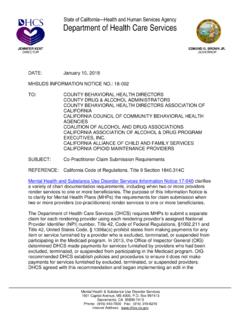Transcription of Jail Health Services Behavioral Health and Reentry ...
1 1 of 4 Revised 6/23/14 jail Health Services Behavioral Health and Reentry programs Mission Statement It is the mission of jail Health s Behavioral Health and Reentry Services programs to provide quality, compassionate, and culturally competent Behavioral Health Services , using professional and community standards of care, to individuals incarcerated in the San Francisco City and County jail system, and to assist these mentally ill individuals, those with co-occurring disorders, and those who are otherwise medically or cognitively vulnerable in establishing linkages with community-based programs to help them avoid re-offending and future incarceration. jail Health s Behavioral Health and Reentry Services programs , formerly jail Psychiatric Services and jail Aftercare Services , have been providing psychiatric treatment and community Reentry planning Services in the San Francisco City and County jail system since March of 1973.
2 Behavioral Health PROGRAM DESCRIPTION The Behavioral Health (BH) program provides a variety of evidence-based in- jail treatment modalities including evaluation, crisis intervention, brief supportive therapy, ongoing individual and group therapy, medication consultation and planning, substance abuse screening, assessment and referrals, and regular monitoring of inmates in psychiatric segregation. Referral for Service. Patients are referred each day by jail Health Services , the Sheriff s Department, the Courts, family, friends, community agencies, and private practitioners. Referrals from outside the jail may be made by calling jail Health s Administrative Office (415/995-1700). Self-referrals are accepted and may be made by directly notifying any jail Health staff or the Sheriff s Department.
3 In addition to the referral sources mentioned above, the judges of the Superior Court issue orders ( PC) daily requesting that BH conduct psychiatric screenings. A formal report with treatment recommendations is filed with the court prior to the next scheduled court date. JBHS assesses over 5,000 inmates each year and provides mental Health Services to a wide range of gender, cultural backgrounds, sexual orientations and religious groups. Most of the mental Health population qualifies for public entitlements, live at or below the poverty line and reside in single room occupancies or are homeless. The ethnicity of 5,000 clients treated breaks down to 43% African-American, 41% Caucasian, 10% Latino, 4% Asian, 1% Native American, 1% other and 15% of the treated population identify as LGBT. Of those who receive a mental status evaluation, 65% require ongoing individual treatment, 35% receive a combination of individual and group therapy, and almost all require Reentry planning Services .
4 2 of 4 Revised 6/23/14 Clinical Assessment and Treatment. An initial assessment is made regarding the presence and/or severity of the inmate s mental illness as well as their amenability to treatment while in jail . For those requiring treatment and who are amenable to participation, a combination of individual, group and milieu therapy will be provided. Clinicians formulate an individualized treatment plan for each patient. BH operates three Psychiatric Sheltered Living Units (PSLU), two for men and one for women, that are designed to serve chronically mentally ill patients who may also have co-occurring substance use disorders. The primary objective of these programs is to equip the individual with the necessary life skills to manage their mental illness so that they are able to function at their full potential. The approach emphasizes accepting mental illness and developing skills to deal with the illness and substance abuse; decriminalizing client's thinking and behavior; and fostering positive social skills and role performance and developing educational, vocational and volunteer skills that will encourage them to pursue paid and volunteer opportunities post-release.
5 Ninety-five percent of the clients that leave this program return to the community and many receive referrals to community treatment through the Reentry Services program. In addition to the Psychiatric Sheltered Living Units, BH runs a Sub-Acute Psychiatric Unit where patients, who are high risk, but not meeting 5150 criteria, are housed and treated. The jail also has psychiatric administrative segregation housing where BH staff provide a higher level of care than in other administrative segregation units. This includes weekly one-on-one individual therapy and daily check-ins with a Mental Health Worker II who monitors and encourages their participation in activities of daily living; provides them with books, magazines, and writing materials; and facilitates contact with family members, attorneys and community Services . In addition, twice weekly groups are held to develop the clients social and coping skills with the goal of facilitating their move to less restrictive housing.
6 Clients who successfully stabilize through a combination of psychotropic medication and therapeutic interventions, are moved to the PSLU where they can continue their recovery in a program that is designed to mirror community treatment programs . All psychiatric treatment provided in the jail is voluntary. Patients who have a serious psychiatric disorder, but are not amenable to treatment and do not meet 5150 WIC criteria for involuntary detention, will be monitored for any changes in their mental status. 3 of 4 Revised 6/23/14 Medication Evaluation. Patients requiring an evaluation for medication are referred to a psychiatrist who determines the need for medication. All patients who receive medications are asked to give written informed consent. Patients who receive medication are provided ongoing individual and most will also receive r group therapy.
7 Referral for Acute Care. For the most seriously disturbed patients, a mental Health professional will evaluate the patient to determine if the patient meets the legal standards of the Welfare and Institutions Code (Section 5150), and Section of the Penal Code to determine the advisability of hospitalization. The patients are transferred to San Francisco General Hospital s ward 7L (Security Ward) within twenty-four hours of determination of need. Once the patient is assessed to be appropriate to return to jail , the patient is returned to the care of BH. Policies and procedures are in place for notifying the hospital of an admission, transportation from the jail to the hospital, notification to the courts and the Sheriff s Department, and discharge (back to jail ) planning. Reentry Services PROGRAM DESCRIPTION The Reentry Services team s primary focus is on inmates with severe and persistent mental illness and serious and debilitating medical issues.
8 Reentry clinicians work closely with their clients to develop comprehensive Reentry plans; provide access to community programs ; ensure continuity of care between the jail and the community; advocate for patient needs; and act as liaisons between the multiple systems impacting the lives of inmates with mental Health issues, co-occurring substance use disorders and chronic medical illnesses. Systems with which the Reentry Services team collaborates include the clients social support systems, the criminal justice system, the legal system and the community Health care system. The majority of patients with whom Reentry works are participants in the San Francisco Superior Court s Behavioral Health Court program. Reentry is responsible for conducting BHC eligibility evaluations and for providing transitional and linkage case management Services to eligible participants.
9 Additionally, Reentry staff provide PC reports daily to the Superior Court in compliance with the court order. Reentry has also been designated by the County Mental Health Director to provide competency restoration treatment to patients charged with a misdemeanor who are found to be incompetent to stand trial. The competency outreach therapist works closely with Community Behavioral Health Services (CBHS) to develop 4 of 4 Revised 6/23/14 treatment plans designed to restore competency and communicates regularly with the courts to keep them apprised of the client s progress. Reentry is responsible for ensuring that all inmates on psychiatric medications are released with a two-week supply of these medications. Additionally, they coordinate discharge prescriptions for inmates who are on medication for a chronic illness. Reentry staff work closely with other criminal justice and community agencies to ensure that any inmate transitioning to a residential treatment program is provided with the necessary medical paperwork, prescriptions, and/or medications needed to facilitate placement.
10 Reentry s goals are to improve public Health and safety outcomes and to reduce recidivism through the implementation of evidenced based practices that help clients to develop healthy and meaningful lives in the community. Clinical Internship Program. Each fall, graduate students are recruited from local universities to participate in Behavioral Health s and Reentry Services clinical internship program. Interns are trained to provide a broad range of mental Health Services , write clinically relevant treatment plans, and identify clinical issues specific to providing treatment in a jail setting. They are also expected to gain a working knowledge of the legal and ethical issues confronted in a forensic setting. Behavioral Health and Reentry Services are committed to hiring and training staff that can provide competent, compassionate, and culturally appropriate mental Health Services to the diverse population found within the San Francisco City and County jails.





